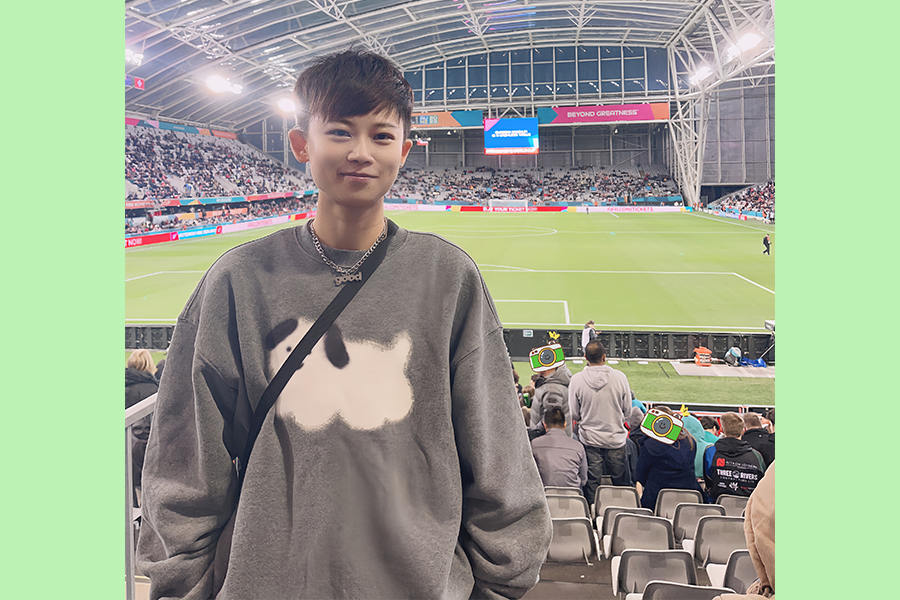
PhD candidate Aaron Hu is looking into the mental health struggles members of the lesbian, gay and bisexual community face in China.
Welcome to the seventh instalment in our series ‘Introducing postgraduate SGSC’, which focuses on postgraduate students within the Sociology, Gender Studies and Criminology Department. In this edition we look at Aaron Hu's research into the the mental health struggles members of the lesbian, gay and bisexual community face in China. There are links at the end of this story to the first instalments of the series.
PhD candidate Aaron Hu is looking into the mental health struggles members of the lesbian, gay and bisexual community face living in China and entering into formative marriages.
China has a LGB population of about 70 million people, but not much research has been conducted on them as homosexuality is considered a “taboo” topic, Hu says.
“I have lots of LGB friends, so that’s why I want to understand and speak out for them,” Hu says.
Hu has conducted interviews over Zoom with 30 people who are a part of the LGB community, most aged in their 20s. For thousands of years in China, marriage and childbearing have been considered two of the most important things a young person can do for their family, modern-day parents notwithstanding.
Under China’s one-child policy during 1979-2015, many LGB people were the only child in their family, putting even more pressure on the child to continue the family’s bloodline.
“Filial piety is the centre of Confucian values, children are expected to meet their family’s expectations,” Hu says.
When teamed with the belief that not being married is a source of shame, it should come as no surprise that many LGB people enter into what it known as a formative marriage - all of the people Hu has interviewed are married to a person of the opposite sex.
“In China, a formative marriage is between a gay and a lesbian, also called contract marriage or fake marriage.
“They’re actually not sexually or romantically attracted to each other but pretend as a heterosexual couple.”
In doing this, they have fulfilled their responsibility to their parents, but are also able to continue exploring or maintaining a same-sex relationship outside of their marriage, which means the formative marriage is more like a “performance”.
A potential downside to formative marriages could be facing backlash from the LGB community.
Homosexuality has been decriminalised and de-pathologised for more than 20 years in China, but members of the LGB community cannot marry their same-sex partner as same-sex marriage is still not legal, and the community still faces a lot of stigma and discrimination, Hu says.
One of the men Hu interviewed talked about how his parents had taken him to the hospital when they found out he was gay, because they thought he had some sort of mental health disorder.
Just a fraction of the parents of the people Hu has interviewed know their child is a member of the LGB community.
“Even if they know or are aware, the parents keep silent and won’t discuss this matter with them.”
Some interviewees may have told some of their closest friends that their marriage is not real.
“I think they are quite helpless, and they frequently have no other choice.”
Most of the people Hu has interviewed are between 20 and 25 years of age. One is older – around 50 – and their story is complicated because they did not become aware of their same-sex attraction until after they got married. They had to come out to their wife and say, “I am gay and I need to divorce you” which was challenging for them and their wife, Hu says.
Formative marriages have been around for many years. The internet has made a huge difference in the past 20 years for LGB people living in rural areas, letting them access information about sexual orientation and making them aware of their homosexual identity, as well as knowing formative marriages are an option, Hu says.
Some have found their marriage partner online, and many never lodge their marriage with the government – so never receive a legal marriage certificate. They will hold a marriage ceremony to announce their fulfilment of family and societal responsibility with a plan to divorce three to five years later.
It much more acceptable to get divorced than it is to never marry, Hu says.
-Kōrero by internal communications adviser Koren Allpress